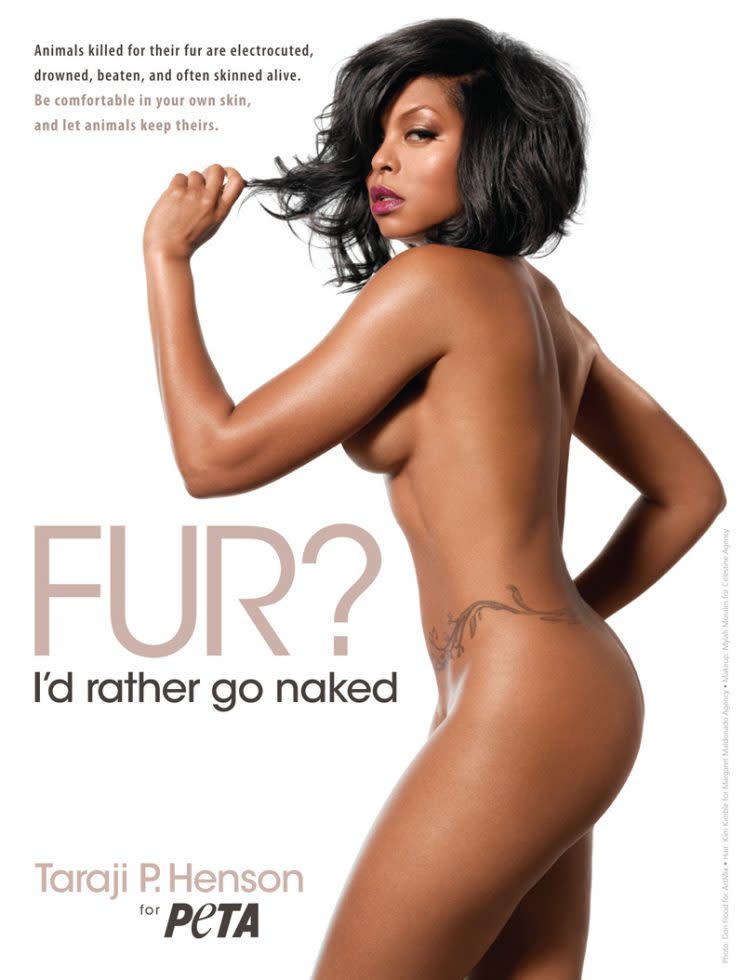Is Faux Fur Becoming as Covetable as Real?

While many celebs and normal folks alike still unapologetically wear real fur (hello, Rihanna, Lady Gaga, Kim Kardashian, Melania Trump, etc…), a not-so-quiet takeover has also been underway — one led by folks who eschew the real thing for cruelty-free versions, whether on the red carpet or the streets. And the beauty is not only philosophical, due to the pile of high-quality faux furs that have hit the market.
“I think what’s happened is fake fur has become so sophisticated and so popular that it’s impossible to tell whether someone is wearing real or fake fur,” Dan Mathews, PETA’s senior vice president of campaigns and the creative force behind its “I’d Rather Go Naked Than Wear Fur” ads, tells Yahoo Style. “Stella McCartney always avoided fake fur because she didn’t want anyone to confuse it with the real thing. But recently she decided to go for it, realizing that her brand is so established that people would know.”
It’s true that in recent celebs-wear-fur roundups, including Yahoo Style’s recent take on Sundance, many in fact wore faux, while a majority of the coats and vests were not easily identifiable either way. And McCartney did indeed go for it with her Pre-Fall 2017 collection, with ethical furry pieces including a long vest of brown fur patches and a similarly hued, cropped jacket (above).
Newsletter: The Yodel
Trusted news and daily delights, right in your inbox
See for yourself — The Yodel is the go-to source for daily news, entertainment and feel-good stories.
British brand Shrimps has also found success with its line of proudly faux-fur scarves and accessories, which are coveted by the fashion set (and widely imitated by other retailers). Meanwhile, longtime animal activist Pamela Anderson recently announced she’d release her own line of faux fur coats, and that she’d love to gift one to the new FLOTUS.
Meanwhile, shots of folks in fake fur, carefully labeled as such, pop up in a constant stream on social media.
But it can feel, at times, that real fur is still ever-present — particularly in the form of hood trim on a particularly popular brand of goose-down parkas, which were the recent target of spirited protests, led by PETA and other organizations, in New York City and Toronto.
“We decided to focus on Canada Goose because of the huge numbers of jackets that use fur collars and trim,” Mathews explains. “They use a lot of coyote that are trapped in the wild and wind up gnawing their legs off out in the freezing cold, and getting separated form their families. That is the tragedy behind the story of Canada Goose jackets.”
The company has responded to pressure — both to its use of coyote fur and the plucked down of geese — through a statement on its website. “We understand and respect that some people think animal products should never be used in any consumer products, however we do not share that view,” it reads in part. The company also claims that it “can certify that our down only comes as a by-product from the poultry industry and has not come from live-plucked or force-fed birds.”

Regarding the use of fur trim, the website notes that it both has a purpose beyond decoration because it “disrupts airflow and creates turbulent air which helps protect the face from frostbite,” and also could be doing the world a favor by killing the animals. “In fact, in many regions of North America, coyotes are considered a pest as they attack livestock, endangered prey species, pets and sometimes even people,” it asserts.
Mathews calls the stance “pretty appalling,” and believes Canada Goose “will be compelled to change” as more and more people learn about their practices — just as the Berlin Film Festival 2017 did when it dropped the jacket provider as a sponsor after receiving coyote-trapping information from PETA.
Such knowledge, Mathews believes, will continue to change buying practices, despite the current popularity of the parkas as well as other authentic furs.

“We write people all the time [to educate them on their furs] and we are frequently told it’s fake,” he says, noting that wearing faux that looks so real can indeed spread a confusing message. But then, he says, “there are other people who hadn’t thought about it.” And those people often have a change of heart when confronted with the realities of animal cruelty — to the point where they want to be featured in the “I’d Rather Go Naked” campaign.
“Ava Mendez and Taraji P. Henson, for example — they used to wear real fur, and we sent them videos and information about how the animals were drowned, electrocuted, and had their necks snapped, and in both situations they wrote back saying they had avoided seeing the information but now that they had, they not only stopped wearing fur, but wanted to be a part of our campaign,” Mathews says.
So while there will always be people “who are heartless about animal suffering and will wear fur, they’re a small minority,” he notes. “I think the real trend is people [giving up] fur, and then speaking out against it.” Here’s hoping.
Related: Pamela Anderson Wants to Give Melania Trump a Faux Fur Coat
6 Vegan Stylists You Need to Know
Let’s keep in touch! Follow Yahoo Beauty on Facebook, Twitter, Instagram, and Pinterest.
Solve the daily Crossword


